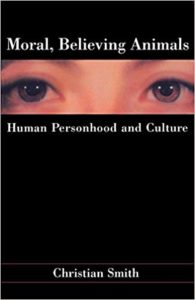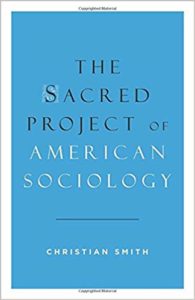
Moral, Believing Animals: Human Personhood and Culture

What Is a Person? Rethinking Humanity, Social Life, and the Moral Good from the Person Up

The Sacred Project of American Sociology

To Flourish or Destruct: A Personalist Theory of Human Goods, Motivations, Failure, and Evil
Paul Sullins is Professor of Sociology at The Catholic University of America.
Introduction
As is well known, in contrast to Plato’s theory that the universal forms of the things we experience exist in an ideal realm (idealism) of which we had knowledge prior to experiencing them, Aristotle thought that they did not exist apart from the things themselves (realism) and could only be recognized by induction after experiencing them. Science, for Aristotle, consists in the endeavor to discern and classify the universal character (or being or reality, the Greek word “on”), of the welter of existing things under the many various categories and relations that we can recognize. But we must also give account of being itself apart from any attributes, or ontology. Being, on this view, consists of all the subjects that we could know or study, but without any of the predicates that delimited the studies of the particular sciences. As the many forms of predicated being are induced from experience with things, so the unified notion of being qua being is induced from the experience of science.
In several recent books, sociologist Christian Smith presents the case for critical realism in science, which proposes to reverse Aristotle’s procedure. Critical realism, according to Smith (hereafter “CRAS”), argues that a proper ontology, or apprehension of being itself, is necessary to understand correctly any of the more limited or predicated instances of being examined in the various sciences. Although it is social science that is mostly in view, CRAS is presented as a general critique of the entire project of current modern science.
Science today, according to CRAS, is severely limited by the adoption of ontologies that are “fatally flawed.” The critical philosophies of Hume, Kant, and Descartes, and the rise of epistemological positivism, have corroded confidence in knowing anything beyond sense experience, or perhaps cognition, leaving the modern intellectual project without access to transcendence. Essences, substances, and causes are mental constructions which may help us understand or cope with experience (idealism) or deceive us regarding it (empiricism), but do not pertain to an objective reality.
In the four books considered in this review, Smith offers hard-hitting critiques of the secularist assumptions of cultural anthropology, psychology, and sociology. Moral, Believing Animals: Human Personhood and Culture (hereafter “MBA”) makes the case that every social order is also an expression of moral or sacred ideas, identities, and orientations, expressed both in personal ideals and social institutions. The rejection of structural functionalism in favor of objective, positive knowledge of society in the mid-20th century left the sociology of culture with an uneasy amalgam of cultural relativism and rational choice theory, unable to provide a convincing explanation of human motivations. Rather than objectivity, Smith argues that
the knowledge we possess [is] based crucially on sets of basic assumptions and beliefs that themselves cannot be empirically verified or established with certainty, that are not universal, and for which no “deeper,” more objective or independent, common body of facts or knowledge exists. (MBA 150)
Thus “[w]e are all inescapably trusting, believing animals” (MBA 150), and “every social order has the sacred at its core” (MBA 152).
In The Sacred Project of American Sociology (“SPAS”) Smith argues that although American sociology presents itself as a secular, scientific enterprise, it is actually engaged in a spiritual quest, based on a philosophy of persons as autonomous, self-directing, and self-empowering which is held sacred—unspoken, universally assumed, and not permitted to be challenged—within the discipline. It has consequently become a pastiche of liberal reformist ideologies which Smith characterizes as “modern liberal-Enlightenment-Marxist-social-reformist-pragmatist-therapeutic-sexually liberated-civil rights-feminist-GLBTQ-social constructionist-poststructuralist/postmodernist” (SPAS 11, italics in original) which find common ground in the attempt, not just to study society, but to promote personal and social transformation.
What is a Person? (“WIAP”) presents Smith’s most extensive introduction to CRAS and critique of alternative modernist epistemologies, pursuant to setting forth the structural elements of an allied theory of human personhood, that is, “critical realist personalism” (thus included in references to “CRAS”), which is developed further with a theory of agency in To Flourish or Destruct (“TFD”).
In opposition to prevailing ideas in the social sciences, which see humans as autonomous individuals whose lives are determined by their place in a social order which expresses ideology and power, CRAS affirms that persons are irreducibly relational beings who generate social structures, which thus relate to universal features of human nature, including moral norms. Human persons seek to flourish, that is, to fulfill their personhood, by pursuing certain basic goods and interests in the context of, or interaction with, the structures of society.
CRAS criticizes modern social science for seeking to explain complex human phenomena with short, simple explanations, an error which Smith emphatically avoids. His root definition of “person” is
a conscious, reflexive, embodied, self-transcending center of subject experience, durable identity, moral commitment and social communication who—as the efficient cause of his or her own responsible actions and interactions—exercises complex capacities for agency and intersubjectivity in order to sustain his or her own incommunicable self in loving relationships with other personal selves and with the nonpersonal world. (WIAP 103)
The “complex capacities” referred to are 30 in number, presented in five levels of complexity (existence, primary experience, secondary experience, creating, and highest order capacities) (WIAP 54, Table 1), elaborated by over 40 specific causal relationships (WIAP 74, Figure 3), which enable the emergence of personhood as something greater than the sum of its parts.
The action of human persons is motivated by six basic goods and interests—physical survival; security and pleasure; knowledge of reality; identity coherence and affirmation; exercising purposive agency; moral affirmation; and social belonging and love (TFD 190)—in interaction with social structures, which are
durable patterns of human social relations, generated and reproduced through social interactions and accumulated and transformed historically over time, that are expressed through lived bodily practices, which are defined by culturally meaningful cognitive categories, motivated in part by normative and moral valuations and guides, capacitated by and imprinted in material resources and artifacts, controlled and reinforced by regulative sanctions, which therefore promote cooperation and conformity and discourage resistance and opposition. (WIAP 326)
The point of all this is that human nature, social structures, and moral norms are real, with a definable character and causal power that shape human life. Personhood, WIAP elaborates, is an emergent property of human capacities, the fulfillment of which in freedom and autonomy forms the chief purpose of human life and society. TFD argues that human actions stem from a motivation to realize what Smith calls “natural human goods”: ends that are, by nature, constitutionally good for all human beings, and thus consistent with human dignity. Evil results from the failure to realize these ends. Thus CRAS ambitiously situates the idea of personhood at the center of our attempts to understand how we might shape good human lives and societies.
For a Christian scholar, there is much to affirm in Smith’s work. CRAS sets forth a form of natural law eudaimonism that is similar to many Christian philosophical anthropologies, and certainly presents a better explanation of human life and meaning, in most regards, than hedonism or relativism. Smith observes that his “account would not unfairly be understood as a secular analogue to other natural law accounts that may be religiously oriented” (TFD 25).
However, it is emphatically not a religious or Christian account of human life, or even one which includes reference to transcendence. Smith informs us (WIAP 10, footnote) that he is giving an account of the ontology of human persons, “which belong to the natural order,” without reference to God, “because God, in my understanding, is radically transcendent and so not bound by nature’s space, time, material being, or laws.” There is, on this view, no comprehension or application of the Christian ideas of creation or incarnation, by which God is connected with nature and space-time. The natural properties of human beings include a soul, by which Smith “simply mean[s] the noncorporeal dimensions of human persons, which, again, belong to the natural world.” They do not, apparently, also include a spirit, in the sense of a capacity for relationship with God or orientation to transcendence as expressed by most Christian theologies. (Smith suggests, in fact, that “spirit” could be used as a synonym for “soul.”)
This blindness to transcendence is probably the greatest weakness of CRAS, and thus will form the bulk of my critique. A theory which asserts strong views of ontology, emergent personhood, and real norms of human dignity cannot then reject or ignore transcendence without revealing a kind of reductionistic naturalism that distorts its perspective. Even Aristotle, whose ontology CRAS resembles in many respects, recognized that the nature of reality predisposed a creator (though perhaps Hegel, minus the idealism, is a better exemplar here). If, as CRAS claims, reality is that which causes; causes are emergent like the tree from the acorn; and entities are interdependent, not autonomous; then what is the emergent cause of the sum of reality? Or, to cite evidence Smith, an eminent scholar of religion, must know quite well, how do we account for the fact that human societies are ineluctably and almost universally religious? If observed human behavior, through retroduction, allows us to apprehend, truly albeit imperfectly, the reality of the human soul, dignity, and morality, why does not the apprehension of the reality of the soul, dignity, and morality also allow us to apprehend, truly albeit imperfectly, the reality corresponding to aspirations to a higher purpose for human life than merely human life itself? To ignore these questions takes a fairly radical naturalism, the limitations of which reverberate throughout Smith’s theory.
For example, Smith struggles, and never fully succeeds, to give a coherent account of human evil, which, he acknowledges, poses “a most problematic challenge for my teleological personalism” (TFD 223). Evil, according to CRAS, stems from a failure to thrive or flourish on the part of some, in this sense a privation of good that results, in part, from a broken social order:
Achieving human flourishing requires a specific set of resources, experiences, and efforts…. People who benefit from and take advantage of the requisites of flourishing stand a good chance of thriving. But the default outcome for those who do not enjoy and capitalize upon these resources, experiences, and efforts is personal failure, stagnation, and degeneration. In some cases, people become evil. (TFD 223)
CRAS asserts (following Aristotle), moreover, that while a few people enact the good, and a few become evil, the mass of persons “do not…undertake the difficult journey toward personal flourishing” (TFD 241), remaining undeveloped in their personhood.
But it is not accurate, empirically or ontologically, to say that most people are latently good, with a few realizing it more fully and a few realizing the lack of good more fully. Rather, what we know of human life and behavior suggests another view: that all persons are devoted to both good and evil and struggle with the conflict and tension between them in their own person. As the late novelist Aleksandr Solzhenitsyn famously put it, in an account of a terribly evil social order: “Gradually it was disclosed to me that the line separating good and evil passes not through states, nor between classes, nor between political parties either—but right through every human heart—and through all human hearts.”1
This is, of course, the claim of the Christian doctrine of original sin, though most religions make a similar claim. The claim could easily be falsified empirically, but never has been, which suggests that the burden of proof rests on those who claim that some are evil and others are not. Is there a single person without evil, who has never failed to flourish in some respect? If so, let Smith present the evidence. And if the presence of evil, or behavior inconsistent with one’s own flourishing, is part of the experience of every person, then it cannot simply be a privation of human being, the result of blocked or impaired capacity in some cases, but, as a universally observed feature of humans on Aristotle’s terms, must be part of human nature itself. Humans fail to flourish not primarily because the social order is broken (though that may contribute to the failure, and we should work to improve it), but because we are broken, or (to move to the Christian image) we live in exile from our true selves.
Moreover, if failure to flourish is natural, yet we also seek to flourish, our telos cannot be that which is presented by CRAS, basically happiness due to self-expression and virtue in human relationships, since ontologically, no real being exists to thwart its own nature. CRAS, in fact, never addresses the central scientific question, by its own account, regarding human personhood: Why are humans persons (and not something else)? Since we are created beings, the question becomes, why were we created with personhood? Christianity provides a cogent and comprehensible answer, which also points us to the proper telos of human nature. We are persons, and not something else, because we were created, not merely for human relationships, but for relationship—communion and union—with God.
CRAS’s naturalism is evidenced in other, striking, omissions. Religion and religious institutions are simply not included in CRAS’s otherwise meticulously comprehensive account of the conditions for human flourishing. The full explication of this observed orientation to transcendent meaning is not accessible to science, of course, but its existence in human life is one of the most well-attested findings of social research. Every social order on earth expresses a recognizable sense of the sacred and a solemnization of meaning beyond death; a fact which Smith has articulated elsewhere more than once. There is also no mention of family or kinship, though these are also universal features of society and most persons would acknowledge them as primary influences on personhood and flourishing. These omissions are not exotic features of (what may be thought) a partisan religiously-informed sociology. The classic sociologist Émile Durkheim, no narrow religionist or metaphysician, recognized both the centrality of religion and the universality of moral failure in society.2 Rather, the omissions signify a commitment, despite the emphasis on ontology, realism, and personhood, to exclude any notion of transcendent meaning.
In sum, CRAS aspires to build a theoretical space for human dignity and metaphysical reality in modern social science, which is a very good thing. It has the not inconsiderable merit of advancing, in an academic field sorely bereft of it, some of the Aristotelian tradition’s wider and older wisdom on human life, though I suspect that Aristotle without CRAS may offer even better wisdom. It also presents an aggressive challenge to dominant forms of thinking whose reductionism is more advanced than its own.
According to Smith, CRAS offers an alternative to sociology’s sacred project of human liberation because it presents human happiness as achieved through the development of personhood based in a telic human nature rather than through individual autonomy and unrestrained self-determination. But in the end, CRAS just presents another version, perhaps more accurate, certainly more complicated, of the same sacred project. Though his understanding of “improving” in the next clause may be very different, the goal of Smith’s sociological efforts is to promote human happiness as a product of improving social structures and personal behavior or relationships, just as it is (Smith argues) for the field of sociology as a whole. Despite claims to be radically different, CRAS offers but another example of what Charles Taylor has called “exclusive humanism,” that is, an account of human life that offers significance without transcendence.
Cite this article
Footnotes
- Aleksandr Solzhenitsyn, The Gulag Archipelago Two, trans. Thomas Whitney (New York: Harper & Row, 1975), 615.
- Émile Durkheim, The Elementary Forms of the Religious Life (New York: Free Press, 1965 [1915]); Émile Durkheim, The Rules of Sociological Method: And Selected Texts on Sociology and Its Method (Simon and Schuster, 2014 [1901]).
























One Comment